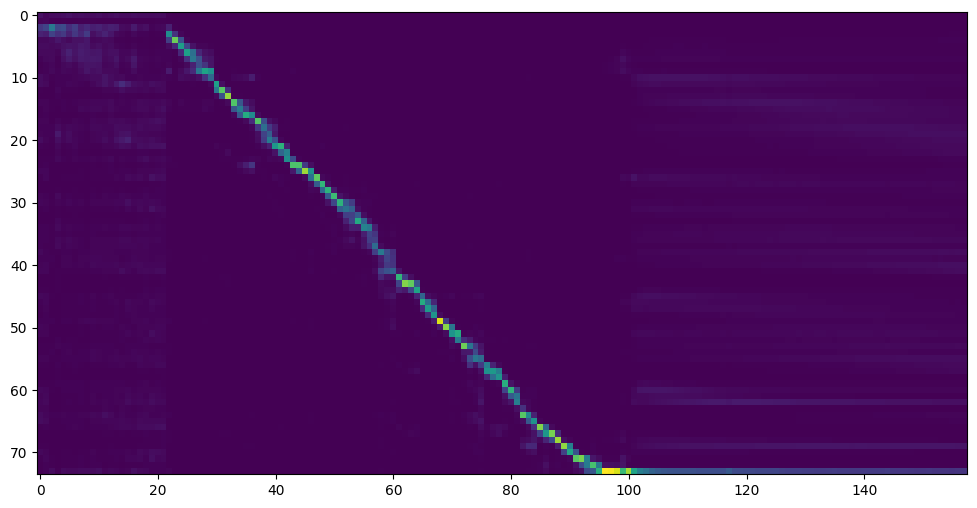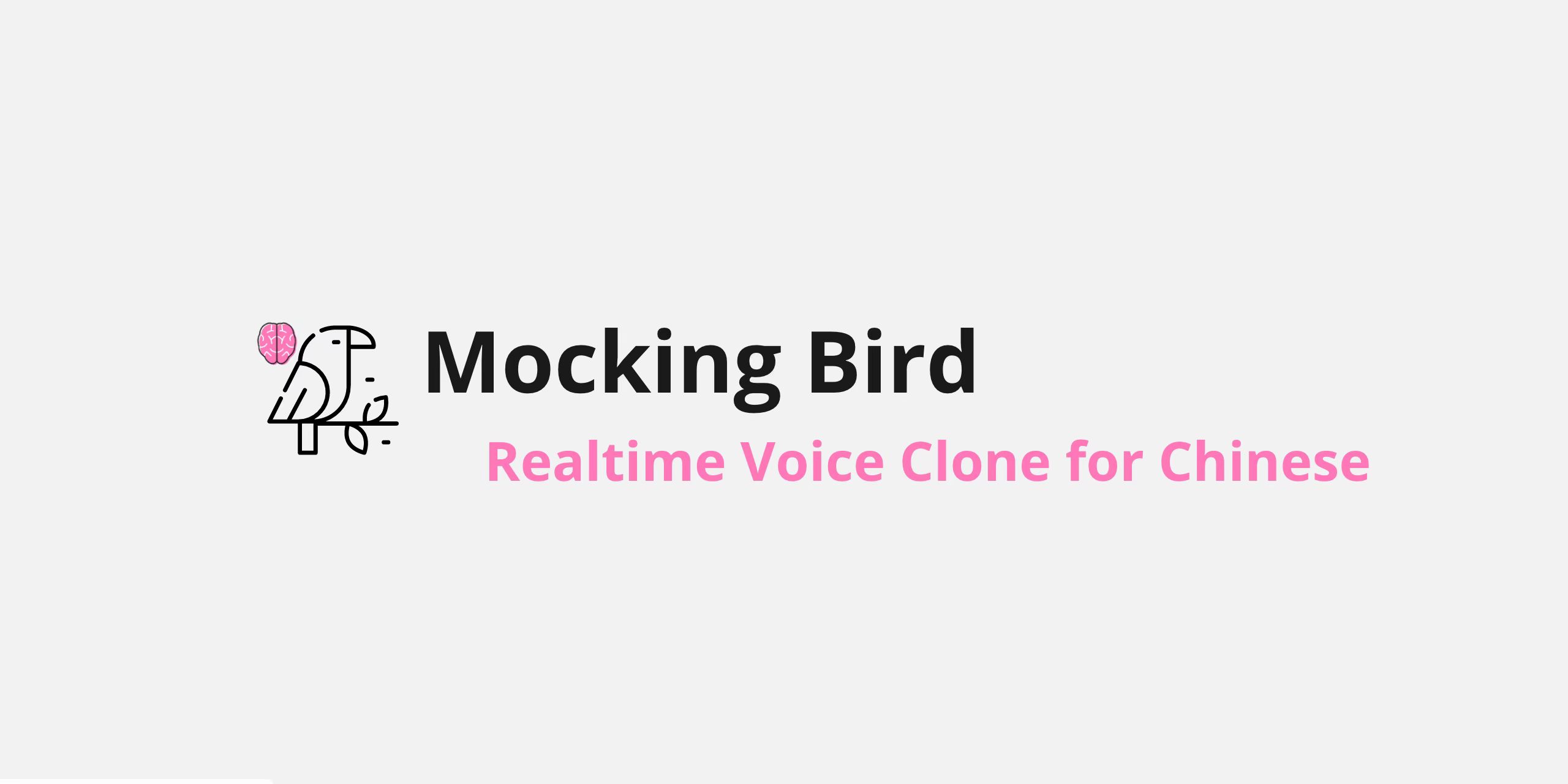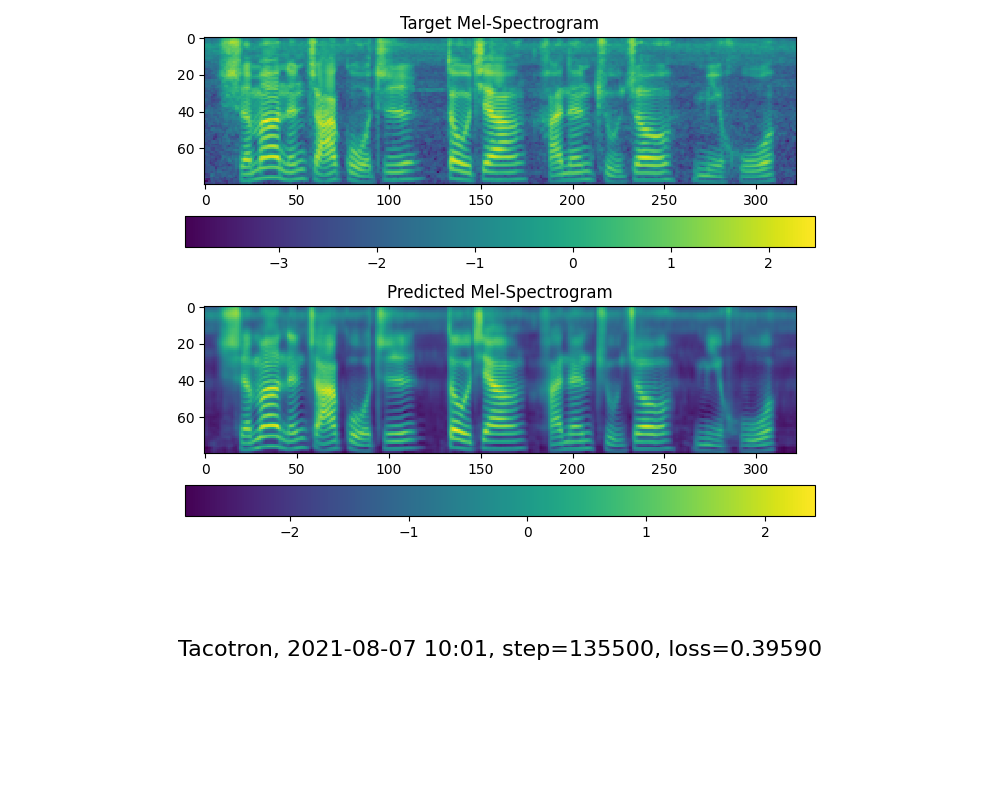English | 中文
DEMO VIDEO | Wiki教程 | 训练教程
🌍 中文 支持普通话并使用多种中文数据集进行测试:aidatatang_200zh, magicdata, aishell3, biaobei, MozillaCommonVoice, data_aishell 等
🤩 PyTorch 适用于 pytorch,已在 1.9.0 版本(最新于 2021 年 8 月)中测试,GPU Tesla T4 和 GTX 2060
🌍 Windows + Linux 可在 Windows 操作系统和 linux 操作系统中运行(苹果系统M1版也有社区成功运行案例)
🤩 Easy & Awesome 仅需下载或新训练合成器(synthesizer)就有良好效果,复用预训练的编码器/声码器,或实时的HiFi-GAN作为vocoder
🌍 Webserver Ready 可伺服你的训练结果,供远程调用
- GUI/客户端大升级与合并
[X] 初始化框架
./mkgui(基于streamlit + fastapi)和 技术设计 [X] 增加 Voice Cloning and Conversion的演示页面 [X] 增加Voice Conversion的预处理preprocessing 和训练 training 页面 [ ] 增加其他的的预处理preprocessing 和训练 training 页面 - 模型后端基于ESPnet2升级
按照原始存储库测试您是否已准备好所有环境。 运行工具箱(demo_toolbox.py)需要 Python 3.7 或更高版本 。
- 安装 PyTorch。
如果在用 pip 方式安装的时候出现
ERROR: Could not find a version that satisfies the requirement torch==1.9.0+cu102 (from versions: 0.1.2, 0.1.2.post1, 0.1.2.post2)这个错误可能是 python 版本过低,3.9 可以安装成功
- 安装 ffmpeg。
- 运行
pip install -r requirements.txt来安装剩余的必要包。 - 安装 webrtcvad
pip install webrtcvad-wheels。
考虑训练您自己专属的模型或者下载社区他人训练好的模型:
近期创建了知乎专题 将不定期更新炼丹小技巧or心得,也欢迎提问
- 进行音频和梅尔频谱图预处理:
python encoder_preprocess.py <datasets_root>使用-d {dataset}指定数据集,支持 librispeech_other,voxceleb1,aidatatang_200zh,使用逗号分割处理多数据集。 - 训练encoder:
python encoder_train.py my_run <datasets_root>/SV2TTS/encoder
训练encoder使用了visdom。你可以加上
-no_visdom禁用visdom,但是有可视化会更好。在单独的命令行/进程中运行"visdom"来启动visdom服务器。
- 下载 数据集并解压:确保您可以访问 train 文件夹中的所有音频文件(如.wav)
- 进行音频和梅尔频谱图预处理:
python pre.py <datasets_root> -d {dataset} -n {number}可传入参数: -d {dataset}指定数据集,支持 aidatatang_200zh, magicdata, aishell3, data_aishell, 不传默认为aidatatang_200zh-n {number}指定并行数,CPU 11770k + 32GB实测10没有问题
假如你下载的
aidatatang_200zh文件放在D盘,train文件路径为D:\data\aidatatang_200zh\corpus\train, 你的datasets_root就是D:\data\
-
训练合成器:
python synthesizer_train.py mandarin <datasets_root>/SV2TTS/synthesizer -
当您在训练文件夹 synthesizer/saved_models/ 中看到注意线显示和损失满足您的需要时,请转到
启动程序一步。
当实在没有设备或者不想慢慢调试,可以使用社区贡献的模型(欢迎持续分享):
| 作者 | 下载链接 | 效果预览 | 信息 |
|---|---|---|---|
| 作者 | https://pan.baidu.com/s/1iONvRxmkI-t1nHqxKytY3g 百度盘链接 4j5d | 75k steps 用3个开源数据集混合训练 | |
| 作者 | https://pan.baidu.com/s/1fMh9IlgKJlL2PIiRTYDUvw 百度盘链接 提取码:om7f | 25k steps 用3个开源数据集混合训练, 切换到tag v0.0.1使用 | |
| @FawenYo | https://drive.google.com/file/d/1H-YGOUHpmqKxJ9FRc6vAjPuqQki24UbC/view?usp=sharing 百度盘链接 提取码:1024 | input output | 200k steps 台湾口音需切换到tag v0.0.1使用 |
| @miven | https://pan.baidu.com/s/1PI-hM3sn5wbeChRryX-RCQ 提取码:2021 | https://www.bilibili.com/video/BV1uh411B7AD/ | 150k steps 注意:根据issue修复 并切换到tag v0.0.1使用 |
对效果影响不大,已经预置3款,如果希望自己训练可以参考以下命令。
- 预处理数据:
python vocoder_preprocess.py <datasets_root> -m <synthesizer_model_path>
<datasets_root>替换为你的数据集目录,<synthesizer_model_path>替换为一个你最好的synthesizer模型目录,例如 sythensizer\saved_models\xxx
- 训练wavernn声码器:
python vocoder_train.py <trainid> <datasets_root>
<trainid>替换为你想要的标识,同一标识再次训练时会延续原模型
- 训练hifigan声码器:
python vocoder_train.py <trainid> <datasets_root> hifigan
<trainid>替换为你想要的标识,同一标识再次训练时会延续原模型
- 训练fregan声码器:
python vocoder_train.py <trainid> <datasets_root> --config config.json fregan
<trainid>替换为你想要的标识,同一标识再次训练时会延续原模型
- 将GAN声码器的训练切换为多GPU模式:修改GAN文件夹下.json文件中的"num_gpus"参数
您可以尝试使用以下命令:
python web.py
运行成功后在浏览器打开地址, 默认为 http://localhost:8080
- 仅支持手动新录音(16khz), 不支持超过4MB的录音,最佳长度在5~15秒
python demo_toolbox.py -d <datasets_root>
请指定一个可用的数据集文件路径,如果有支持的数据集则会自动加载供调试,也同时会作为手动录制音频的存储目录。
想像柯南拿着变声器然后发出毛利小五郎的声音吗?本项目现基于PPG-VC,引入额外两个模块(PPG extractor + PPG2Mel), 可以实现变声功能。(文档不全,尤其是训练部分,正在努力补充中)
- 确保项目以上环境已经安装ok,运行
pip install espnet来安装剩余的必要包。 - 下载以下模型 链接:https://pan.baidu.com/s/1bl_x_DHJSAUyN2fma-Q_Wg
提取码:gh41
- 24K采样率专用的vocoder(hifigan)到 vocoder\saved_models\xxx
- 预训练的ppg特征encoder(ppg_extractor)到 ppg_extractor\saved_models\xxx
- 预训练的PPG2Mel到 ppg2mel\saved_models\xxx
- 下载aidatatang_200zh数据集并解压:确保您可以访问 train 文件夹中的所有音频文件(如.wav)
- 进行音频和梅尔频谱图预处理:
python pre4ppg.py <datasets_root> -d {dataset} -n {number}可传入参数: -d {dataset}指定数据集,支持 aidatatang_200zh, 不传默认为aidatatang_200zh-n {number}指定并行数,CPU 11700k在8的情况下,需要运行12到18小时!待优化
假如你下载的
aidatatang_200zh文件放在D盘,train文件路径为D:\data\aidatatang_200zh\corpus\train, 你的datasets_root就是D:\data\
- 训练合成器, 注意在上一步先下载好
ppg2mel.yaml, 修改里面的地址指向预训练好的文件夹:python ppg2mel_train.py --config .\ppg2mel\saved_models\ppg2mel.yaml --oneshotvc - 如果想要继续上一次的训练,可以通过
--load .\ppg2mel\saved_models\<old_pt_file>参数指定一个预训练模型文件。
您可以尝试使用以下命令:
python demo_toolbox.py -vc -d <datasets_root>
请指定一个可用的数据集文件路径,如果有支持的数据集则会自动加载供调试,也同时会作为手动录制音频的存储目录。
该库一开始从仅支持英语的Real-Time-Voice-Cloning 分叉出来的,鸣谢作者。
| URL | Designation | 标题 | 实现源码 |
|---|---|---|---|
| 1803.09017 | GlobalStyleToken (synthesizer) | Style Tokens: Unsupervised Style Modeling, Control and Transfer in End-to-End Speech Synthesis | 本代码库 |
| 2010.05646 | HiFi-GAN (vocoder) | Generative Adversarial Networks for Efficient and High Fidelity Speech Synthesis | 本代码库 |
| 2106.02297 | Fre-GAN (vocoder) | Fre-GAN: Adversarial Frequency-consistent Audio Synthesis | 本代码库 |
| 1806.04558 | SV2TTS | Transfer Learning from Speaker Verification to Multispeaker Text-To-Speech Synthesis | 本代码库 |
| 1802.08435 | WaveRNN (vocoder) | Efficient Neural Audio Synthesis | fatchord/WaveRNN |
| 1703.10135 | Tacotron (synthesizer) | Tacotron: Towards End-to-End Speech Synthesis | fatchord/WaveRNN |
| 1710.10467 | GE2E (encoder) | Generalized End-To-End Loss for Speaker Verification | 本代码库 |
| 数据集 | OpenSLR地址 | 其他源 (Google Drive, Baidu网盘等) |
|---|---|---|
| aidatatang_200zh | OpenSLR | Google Drive |
| magicdata | OpenSLR | Google Drive (Dev set) |
| aishell3 | OpenSLR | Google Drive |
| data_aishell | OpenSLR |
解压 aidatatang_200zh 后,还需将
aidatatang_200zh\corpus\train下的文件全选解压缩
假如数据集路径为 D:\data\aidatatang_200zh,那么 <datasets_root>就是 D:\data
训练合成器时:将 synthesizer/hparams.py中的batch_size参数调小
//调整前
tts_schedule = [(2, 1e-3, 20_000, 12), # Progressive training schedule
(2, 5e-4, 40_000, 12), # (r, lr, step, batch_size)
(2, 2e-4, 80_000, 12), #
(2, 1e-4, 160_000, 12), # r = reduction factor (# of mel frames
(2, 3e-5, 320_000, 12), # synthesized for each decoder iteration)
(2, 1e-5, 640_000, 12)], # lr = learning rate
//调整后
tts_schedule = [(2, 1e-3, 20_000, 8), # Progressive training schedule
(2, 5e-4, 40_000, 8), # (r, lr, step, batch_size)
(2, 2e-4, 80_000, 8), #
(2, 1e-4, 160_000, 8), # r = reduction factor (# of mel frames
(2, 3e-5, 320_000, 8), # synthesized for each decoder iteration)
(2, 1e-5, 640_000, 8)], # lr = learning rate
声码器-预处理数据集时:将 synthesizer/hparams.py中的batch_size参数调小
//调整前
### Data Preprocessing
max_mel_frames = 900,
rescale = True,
rescaling_max = 0.9,
synthesis_batch_size = 16, # For vocoder preprocessing and inference.
//调整后
### Data Preprocessing
max_mel_frames = 900,
rescale = True,
rescaling_max = 0.9,
synthesis_batch_size = 8, # For vocoder preprocessing and inference.
声码器-训练声码器时:将 vocoder/wavernn/hparams.py中的batch_size参数调小
//调整前
# Training
voc_batch_size = 100
voc_lr = 1e-4
voc_gen_at_checkpoint = 5
voc_pad = 2
//调整后
# Training
voc_batch_size = 6
voc_lr = 1e-4
voc_gen_at_checkpoint = 5
voc_pad =2
4.碰到RuntimeError: Error(s) in loading state_dict for Tacotron: size mismatch for encoder.embedding.weight: copying a param with shape torch.Size([70, 512]) from checkpoint, the shape in current model is torch.Size([75, 512]).
请参照 issue #37
视情况调整batch_size参数来改善
请参考这篇文章,将虚拟内存更改为100G(102400),例如:文件放置D盘就更改D盘的虚拟内存
首先一定要出现注意力模型,其次是loss足够低,取决于硬件设备和数据集。拿本人的供参考,我的注意力是在 18k 步之后出现的,并且在 50k 步之后损失变得低于 0.4





